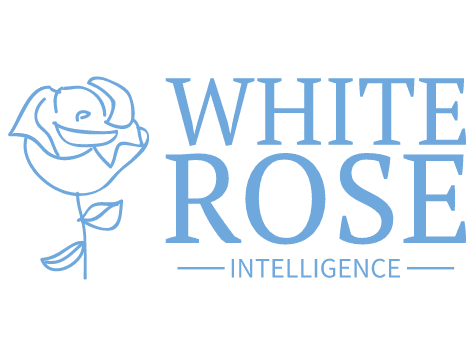ATIP request sheds light on inner workings of CBC’s COVID-19 propaganda strategies
Originally published by Microjourneys on Substack
Over the past several years, I have participated in various working groups focused on accessing public records through Freedom of Information (FOI) and related mechanisms. Through the work of the most recent iteration of this effort, we have successfully accumulated a growing collection of internal emails, public health data and other relevant documents, which have helped us strengthen our understanding of Canada’s COVID-19 response and prepare to launch and support legal action.
Our quest for documents has spanned municipal, provincial and federal governments, with a particular focus on the Governments of Canada and Ontario (the country’s most populous province).
A week and a half ago, my colleague Karen sent out the most recent batch of documents released through an Access to Information and Privacy (ATIP) request to the Canadian Broadcasting Corporation (CBC), Canada’s national broadcaster. CBC is a federal Crown corporation, which means it is wholly-owned by the Government of Canada. As of September 1, 2007, it is subject to the Access to Information Act, allowing Canadians to submit ATIP requests just as they would any other government agency.1
Today, I’m going to take you through what I learned from reading through the 186-page document release. You can download the original, unaltered PDF at the end of this post.
Input from CBC’s Director of Journalistic Standards
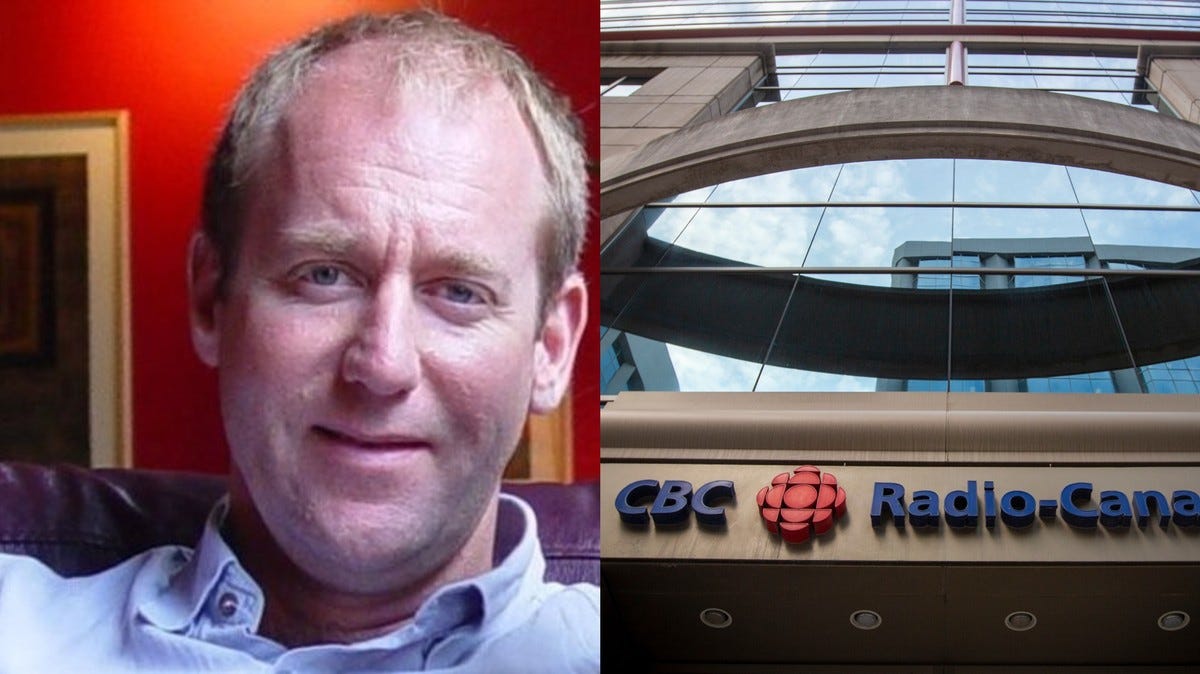
Paul Hambleton, CBC’s former Director of Journalistic Standards, was frequently engaged with the outlet’s reporters and editorial team on issues related to the integrity of its COVID-19 reporting.
His first email on the topic was March 27, 2020, titled “JSP COVID-19 and the NUMBERS.” The message is entirely redacted, aside from introducing the grey block as containing “Friday thoughts on our formidable COVID-19 coverage.” He sent a second email titled “JSP and Social Media” three days later, with even more redactions.
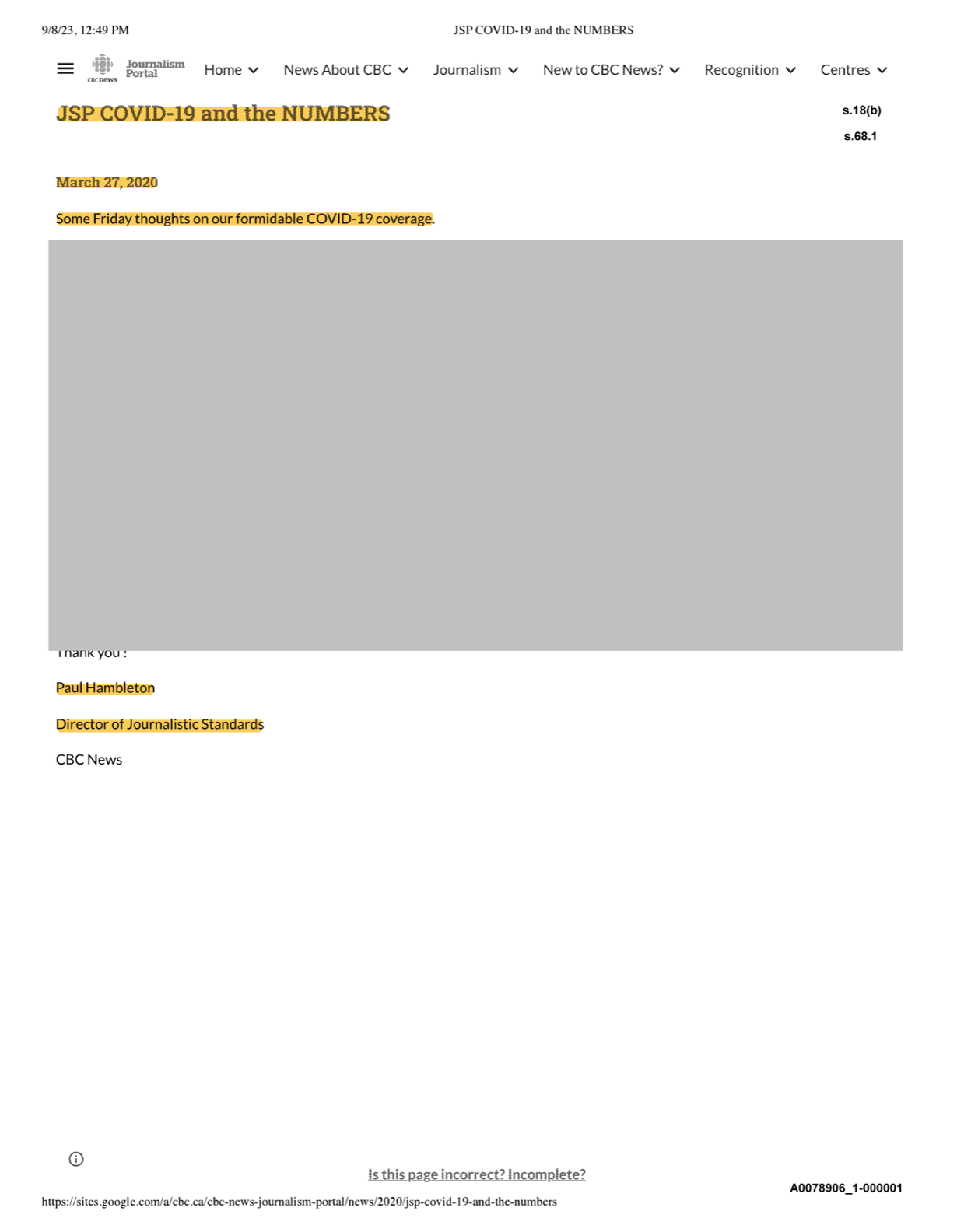
On April 17, 2020, Hambleton sent another email titled “JSP COVID-19 reflections.” After a month of the declared COVID-19 pandemic, he sought to “pass on some observations from the JSP desk on COVID-19 issues” that he’d “seen come up recently.”
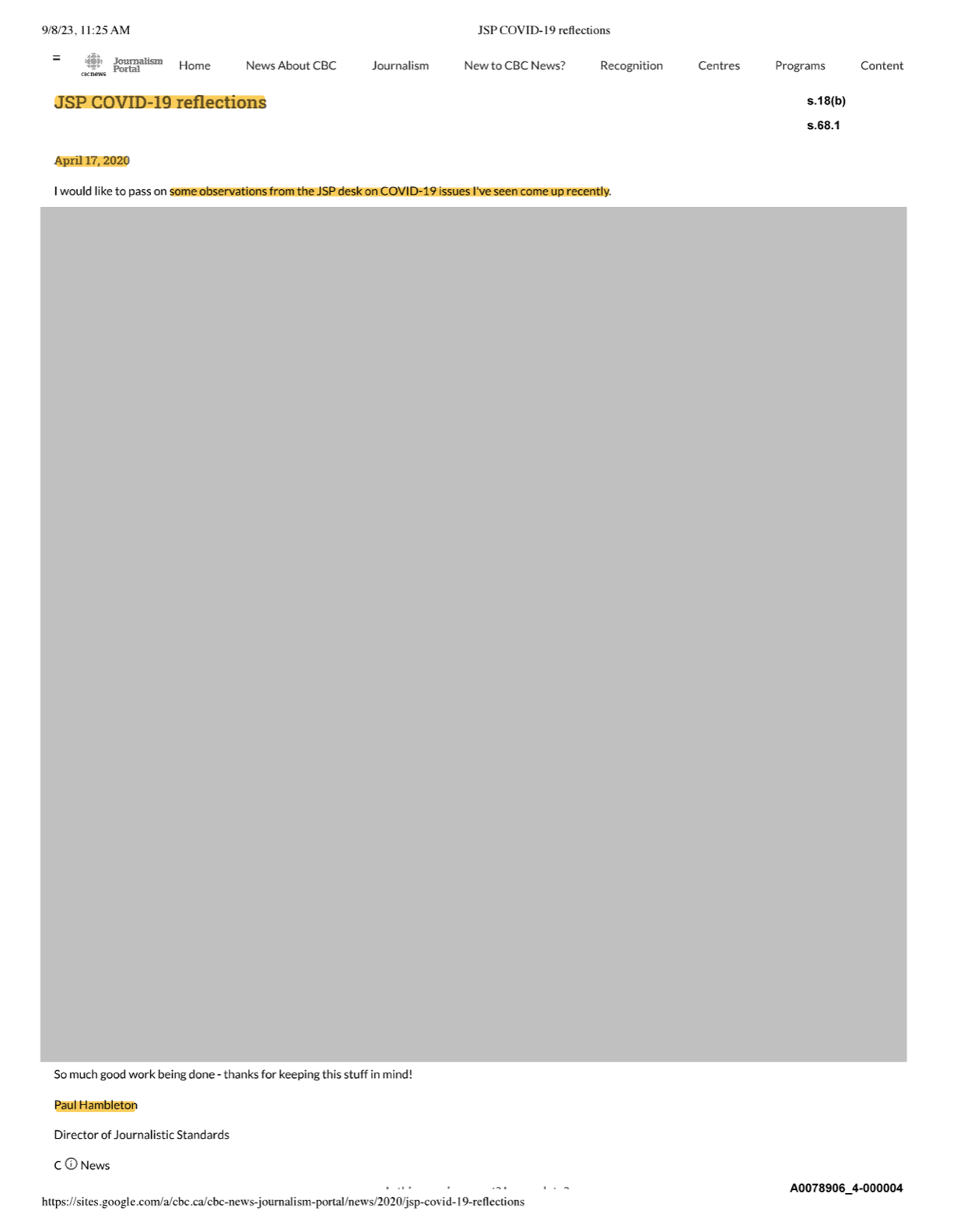
In an August 25, 2020 email titled “Some JSP thoughts,” Hambleton offered the following:
Impartiality, balance and fairness are always top of mind and I thought I’d raise a couple of familiar themes that surfaced through some of the audience feedback I got over the past couple of months.
After yet another huge redaction block, Hambleton signed off by thanking staff for their “vigilance on these things.” It is certainly refreshing to hear that at least somebody at the CBC was taking in feedback from its readers. If only we were privy to the specifics of his guidance.
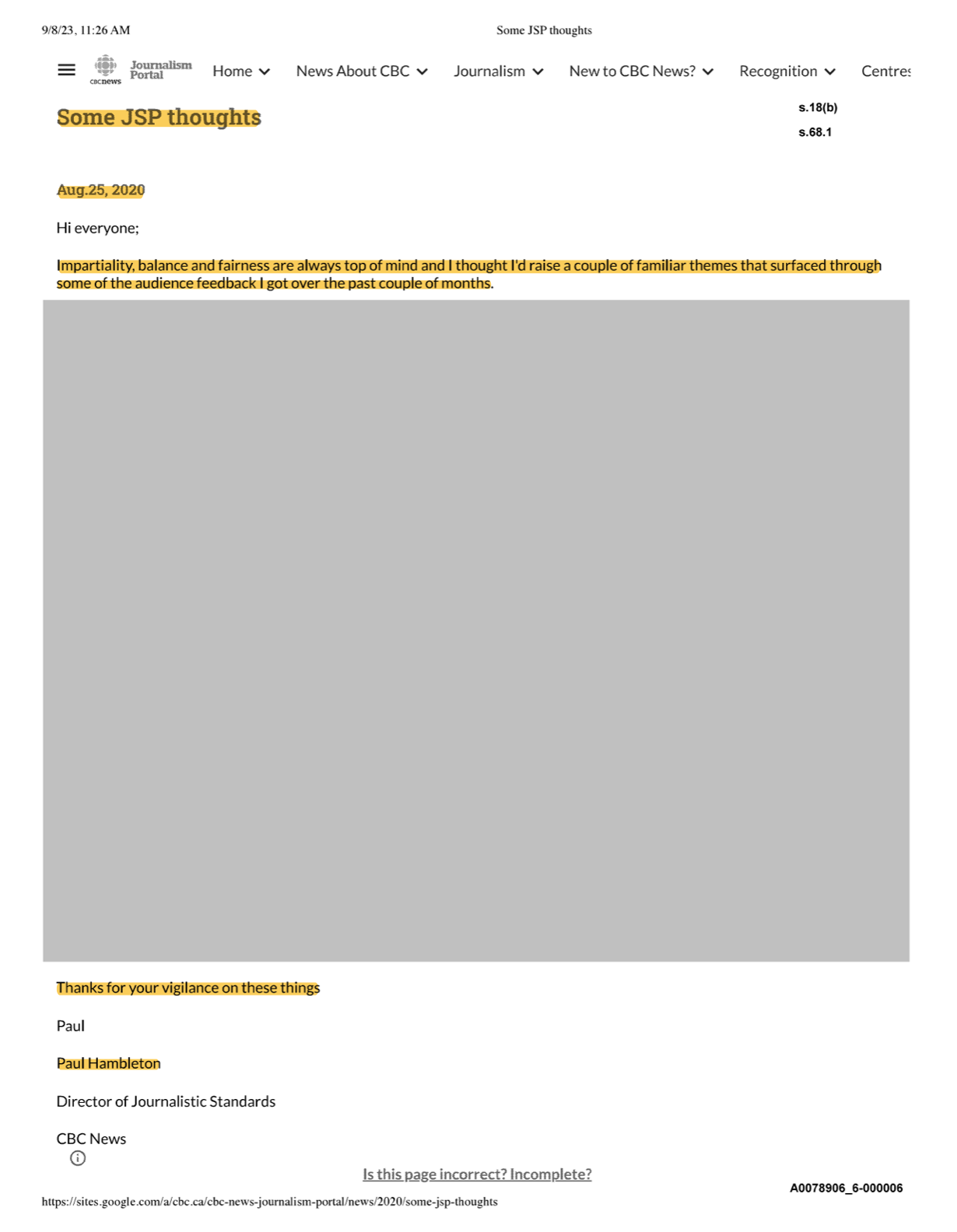
He followed up on September 9, 2020 with an email titled “JSP Notes – COVID-19” where he offered “[t]wo things to bear in mind that have surfaced recently.” Just under a month later, in an October 5 email titled “More JSP thoughts and considerations,” he offered “some observations… about issues that surfaced recently.” While the “long read” is almost entirely redacted, we are left with a telling heading: “PRECISION.”
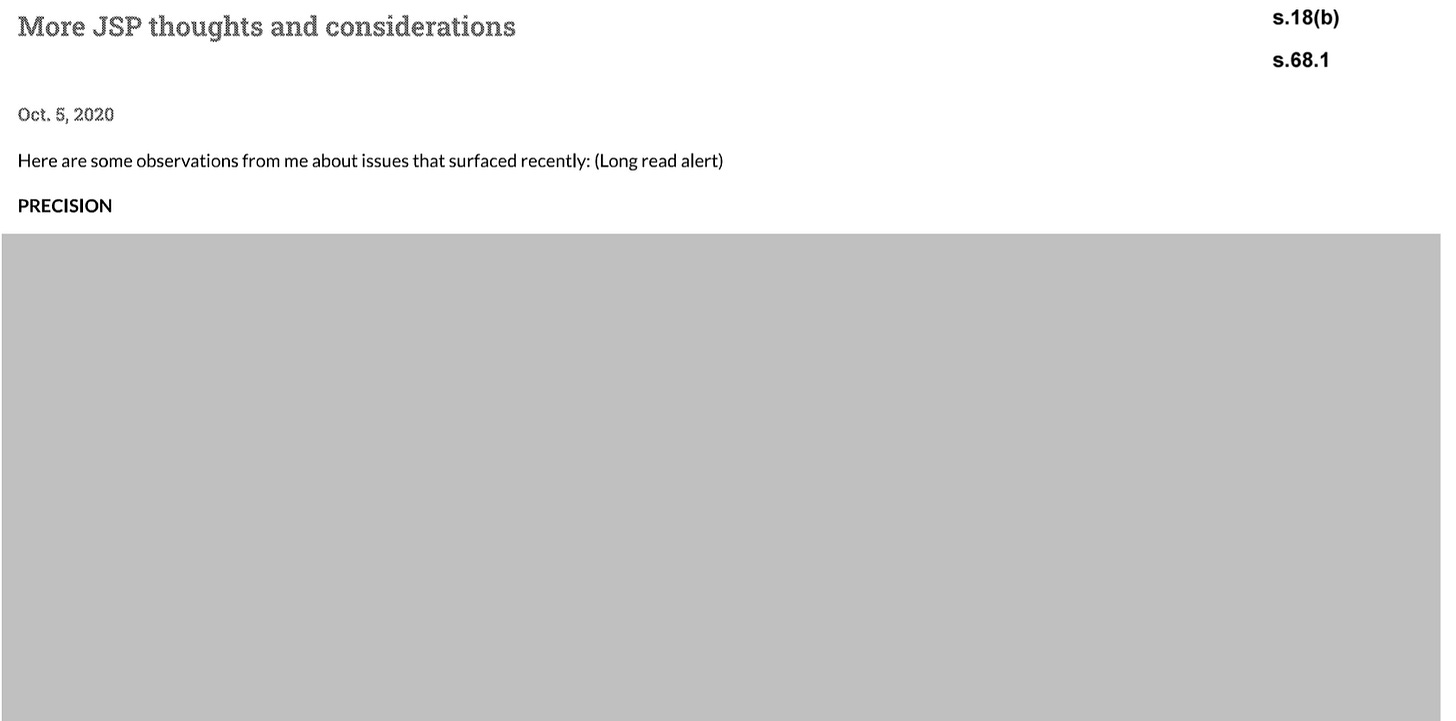
The only Hambleton email provided from 2021 is titled “Friday JSP thoughts – election.” Dated August 20th, the message came five days after Prime Minister Justin Trudeau called a snap election, and exactly one month in advance of election day.2 Recall that Prime Minister Justin Trudeau made mandatory COVID-19 vaccination policies a core issue of his campaign. Here is a snippet written by Politico’s Andy Blatchford, published on the day Trudeau called the election:3
“We chose to make sure that federal public servants and everyone boarding a train or a plane be vaccinated. Not everyone agrees. Not every political party agrees,” Trudeau told reporters outside the front doors of Rideau Hall, where Governor General Mary Simon accepted his request to dissolve Parliament. “Well, Canadians should be able to weigh in on that, and on so much more.”
In other words, Trudeau himself ensured that the 2021 federal election would fall into the scope of this COVID-19-related ATIP request.
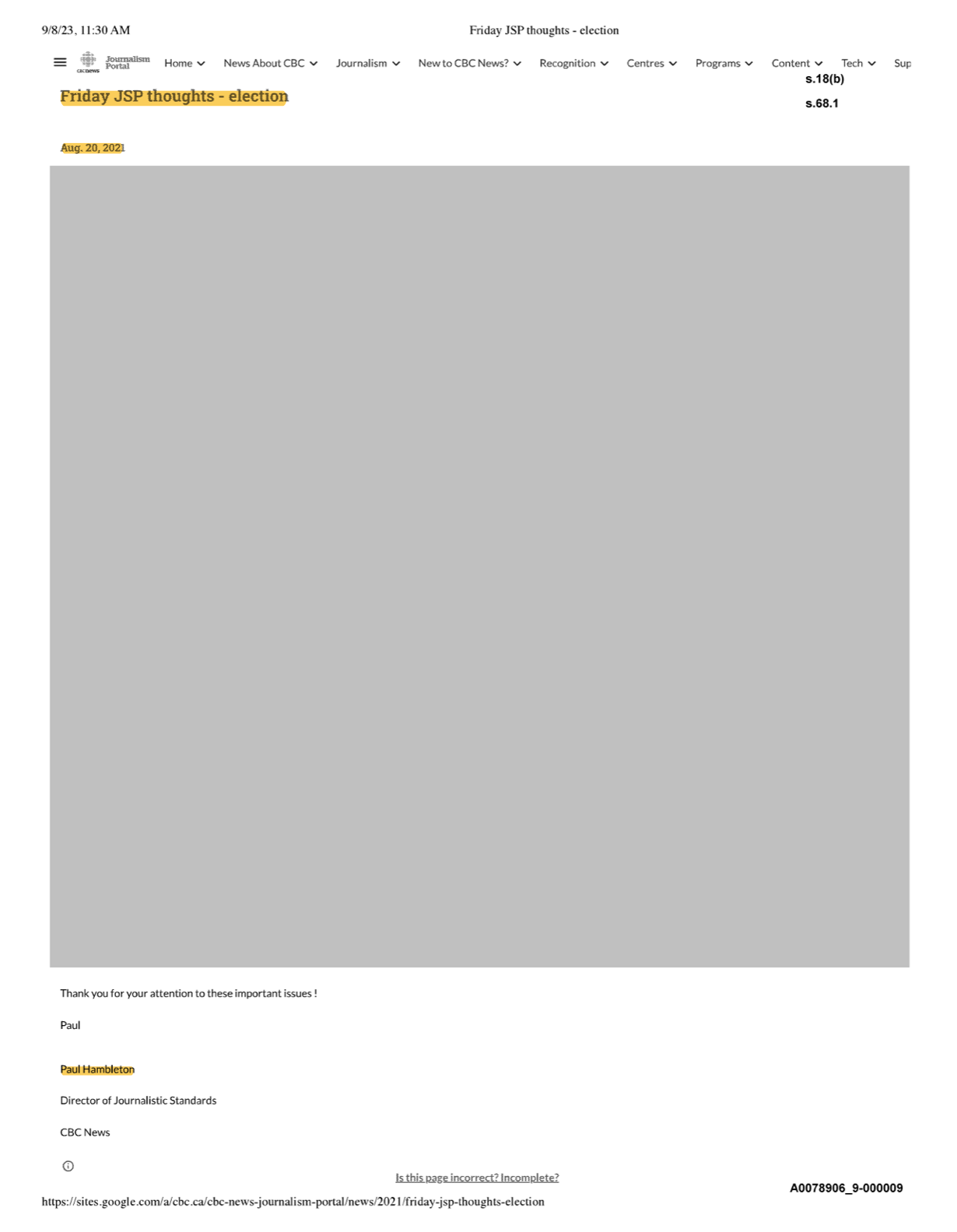
Hambleton’s resignation
Hambleton did not remain in his position as Director of Journalistic Standards for much longer after his August 2021 election memo. He had, in fact, been facing an unrelated internal crisis related to comments made by former commentator Don Cherry in November 2019,4 which eventually led to Hambleton announcing an early retirement on October 15, 2021. His position was effectively superseded by a new Journalistic Standards and Practices Advisory Committee who could support his official replacement “in a proactive and consultative way on matters of inclusion and equity.”5 According to Hambleton’s LinkedIn profile, he ultimately ended his 30-year career with the CBC in March 2022.6
The next person to take on Hambleton’s former title was George Achi, who only appears once in the disclosure package we received.7 He co-authored an October 24, 2022 email titled “Language note: Convoy protests: avoid ‘so-called’” with Senior Standards Editor Blair Shewchuk. Despite the intriguing title, we are not provided any insight into what use of the term “so-called” the pair found problematic.
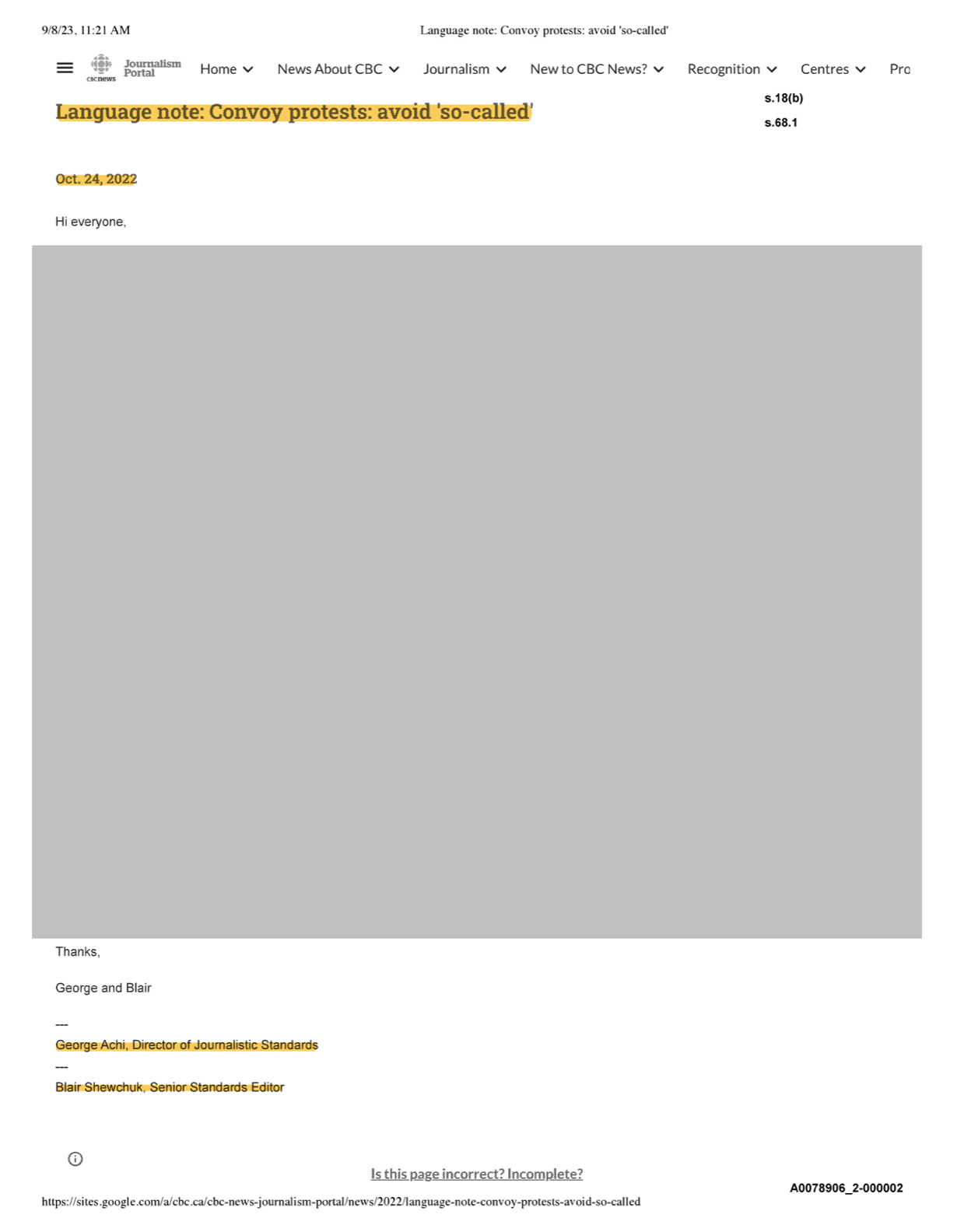
COVID-Check
While a good chunk of the ATIP disclosure was padded with copies of news articles that were already public, they did provide an excellent opportunity to review what the CBC did immediately following the declaration of the COVID-19 pandemic.
For example, this March 25, 2020 article titled, “An update on local services and all the ways to access COVID-19 information on CBC News,” which mentions that the outlet “launched a COVID-19 fact checking unit to expose falsehoods and disinformation around the global pandemic.”

The original article is still online, complete with hyperlinks to the fact-checking unit’s “early work”:8
- March 23, 2020: Viral video claiming 5G caused pandemic easily debunked
- March 24, 2020: No, the new coronavirus wasn’t created in a lab, scientists say
Both of these are dumb, grossly naive attempts to assert intellectual authority over topics the authors have no hope of understanding, any more than the panicked public they’re ostensibly attempting to inform. But the articles do reveal that the CBC’s fact-checking program is called COVID-Check.9 Another article on page 48 of the response package titled “Canada not immune to the virus of COVID-19 conspiracies” further reveals that COVID-Check has a French language counterpart called Décrypteurs.10
CBC Coronavirus Tracker
Also mentioned in the March 25 article is CBC’s Coronavirus Tracker, which appears to have launched on March 21, 2020.11
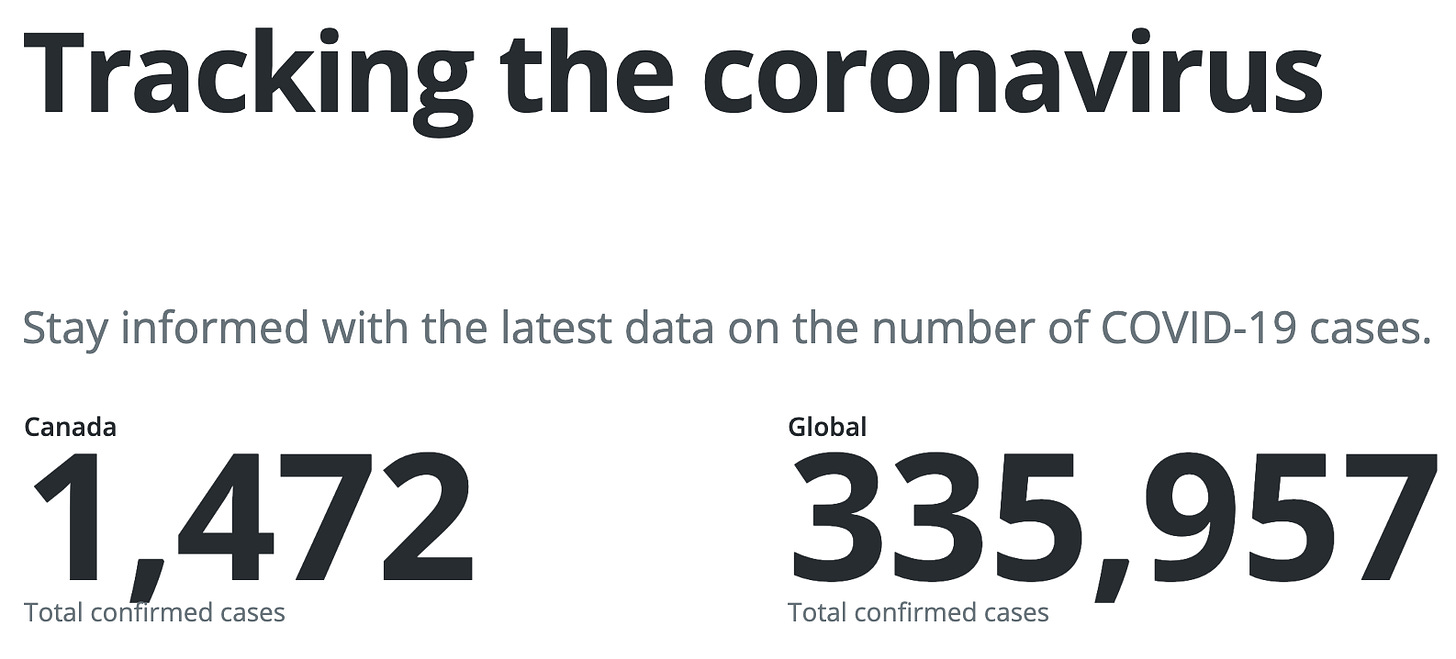
Developed by something called CBC News Labs, the dashboard cites CBC News as its source for Canadian data, and Johns Hopkins University for international data. The earliest archived version also hosts a set of Frequently Asked Questions (FAQ) that have not all aged well. Let’s take this for example:
Q: What should I do if I have fever, cough or shortness of breath?
A: Fever, cough and shortness of breath can be symptoms of COVID-19, the disease caused by the novel coronavirus — but they’re also symptoms of seasonal flu and other respiratory illnesses that are common at this time of year.
Call your local public health unit if:
- You have even mild symptoms.
- You have been exposed to someone known to be infected.
Indeed, CBC correctly points out that the symptoms most commonly associated with COVID-19 are identical to those caused by the flu, and “other respiratory illnesses”—like the common cold or seasonal allergies. This would be helpful if the FAQ didn’t then direct readers to report themselves as a presumptive COVID-19 case if they had “even mild symptoms” or no symptoms at all.
Then, there’s this gem:
Q: Should I wear a mask?
A: If you’re not sick, the answer is no. There’s no evidence that wearing a mask will protect you from becoming infected in your day-to-day life.
Health-care workers wear N95 masks — these are specialized masks that block smaller particles. It’s important to preserve the supply of these masks for health-care workers.
But if you are sick, there is some evidence that wearing a mask will help reduce the amount of virus around you, potentially offering a measure of protection to others.
Finally, we find that CBC was promoting the idea of a forthcoming vaccine right from the very beginning:
Q: Is there a vaccine?
A: A vaccine to stop the spread is at least a year away. Here’s a look inside some of the Canadian labs doing research.
The hyperlink leads to a March 14, 2020 article titled “COVID-19 vaccine research takes on new urgency.” Coming just three days after the World Health Organization declared COVID-19 to be a Public Health Emergency of International Concern (PHEIC),12 the article highlights in rapid succession the already-ongoing efforts of various organizations to rush “experimental” COVID-19 vaccine candidates through clinical development, with an unprecedented focus on using mRNA and adenoviral vector-based gene therapy as the platform globally.13
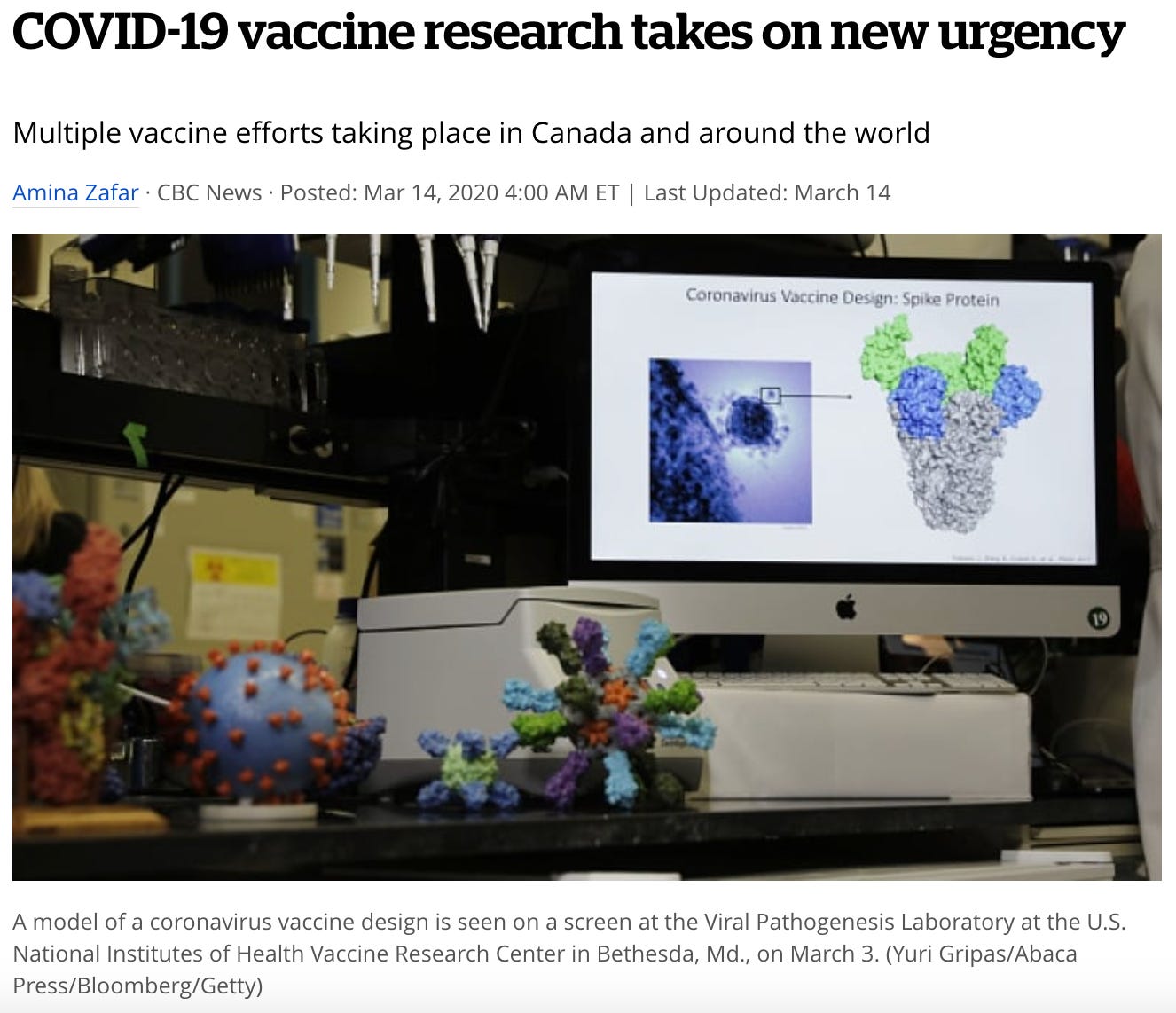
Among those featured are:
- The Vaccine Research Center at Dr. Anthony Fauci’s National Institute of Allergy and Infectious Diseases (NIAID), working in partnership with Moderna
- The Government of Canada’s “$2.7 million in funding for vaccine candidates.”
- The Coalition for Epidemic Preparedness Innovations (CEPI), which invested “more than $23 million US in the development of new vaccines against COVID-19.”
- The Group of Seven (G7), led by French president Emmanuel Macron, which subsequently put out a statement pledging to “support the launch of joint research projects funded by both public and private resources, and the sharing of facilities, towards rapid development, manufacture and distribution of treatments and a vaccine, adhering to the principles of efficacy, safety, and accessibility.”14
- MIGAL Galilee Research Institute in Israel developing an oral protein subunit vaccine candidate15
- Denis Leclerc and colleagues at the University of Laval, who were developing a viral vector COVID-19 vaccine candidate16
- Medicago, developer of Canada’s only approved plant-based COVID-19 vaccine
- And finally, Charu Kaushic, Director of the Institute of Infection and Immunity at the Canadian Institutes of Health Research. Despite providing several comments for the article, she fails to mention that she had recently returned from a seminar co-hosted by the WHO and the Global Research Collaboration for Infectious Disease Preparedness (GloPID-R)—an organization which Kaushic chairs—where various public health and pharmaceutical industry leaders set the global research priorities for everything related to COVID-19.17 Don’t believe me? Listen to Kaushic herself explain how they did it.
Interestingly, I couldn’t find much at all about CBC News Labs, apart from this “Climate Dashboard” which launched May 3, 2023.18
CBC consolidated news coverage
Another interesting move I wasn’t aware of is the CBC’s decision to “temporarily scrap” local news broadcasts, consolidating attention and resources towards its national broadcast.19 The stated intention was to make the national CBC News Network into the “core live breaking-news service,” ostensibly in response to public health measures that limited the organization’s ability to do their job.
The result, of course, was the centralization of messaging on the unfolding crisis, taking away any opportunity for local reporters, producers and editors to divert from the official national narrative. Anybody watching CBC would no longer be taking in the range of perspectives and experiences informed by different regions of the country. Additionally, CBC boasted that they had “partnered with Canada’s private broadcasters to pool video coverage of official press briefings across the country in order to space out the number of crews present at any one event.” In other words, a far more limited number of people with the opportunity to ask hard questions to our public health officials and politicians.
CBC almost immediately moved to reverse the pause on local broadcasting after facing heavy criticism, including from Prince Edward Island’s Premier Dennis King.20 It’s unclear how long it took to actually get things back up and running.
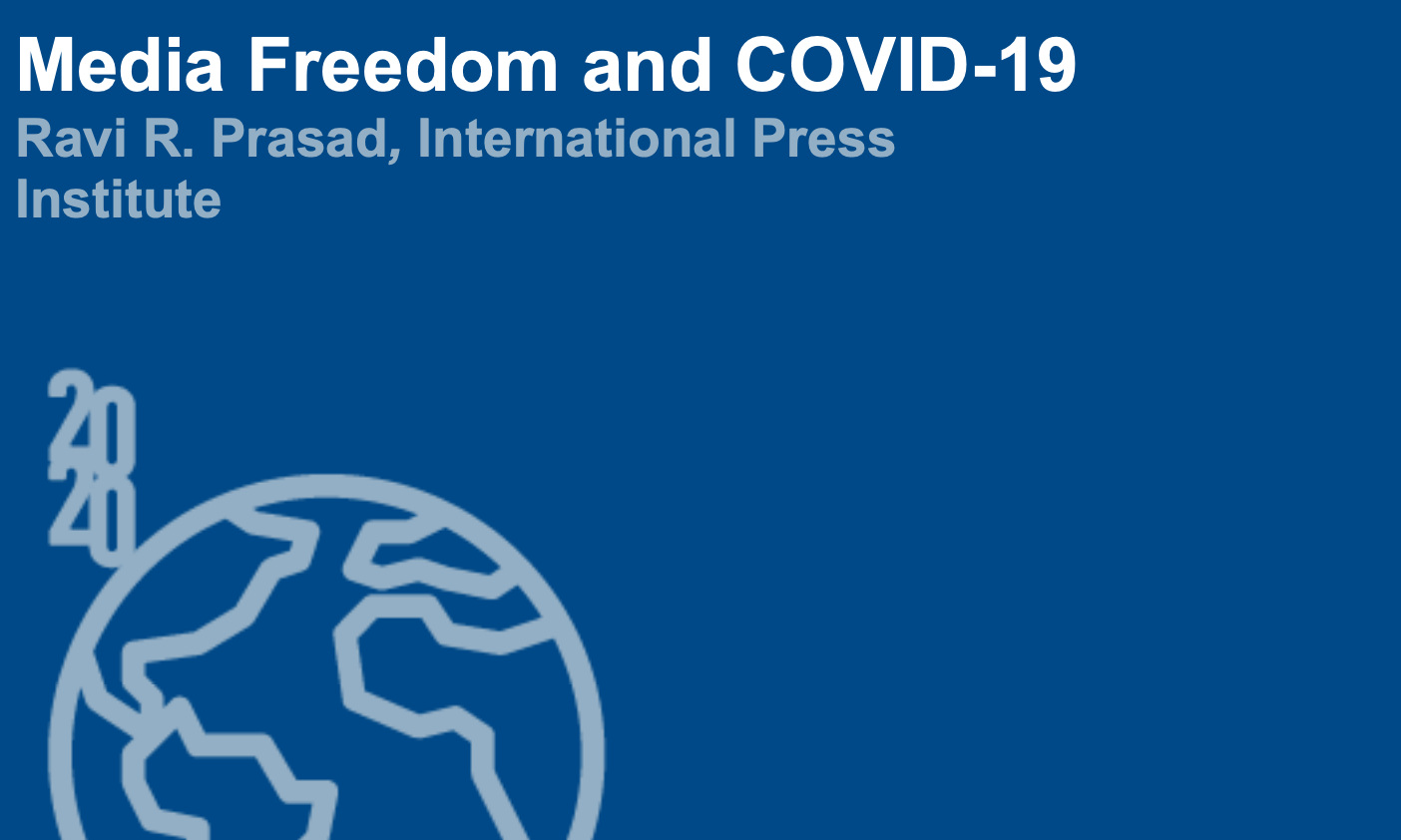
Ironically, Global Affairs Canada published a November 16, 2020 report titled Media Freedom and COVID-19 written by Ravi R. Prasad of the International Press Institute.21 As noted in the executive summary:
“As the COVID-19 virus spread, journalists and media outlets rose to the challenge while dealing with the limitations that the virus posed on their work. While disseminating information about the health crisis, media also highlighted the shortcomings in the response by governments and spoke truth to power.
However, many governments responded to the crisis by imposing harsh measures to control the public narrative about the pandemic and cover up their inadequacies. They clamped down on the media to control information and public debate about the pandemic. Emergency regulations were put in place, while new and existing laws relating to disinformation and fake news were used to stifle independent media. In several countries, journalists from independent media were denied access to press briefings and regulations were imposed to compel media organizations to report data provided by the government.“
Sound familiar? Prasad’s report is a breath of fresh air, even though I take issue with some of his assertions. Still, he concludes by demanding that governments around the world “immediately withdraw all measures limiting independent media coverage and equal access to information and stop misusing the crisis to restrict press freedom and freedom of expression.” Presumably, this should also include Canada.
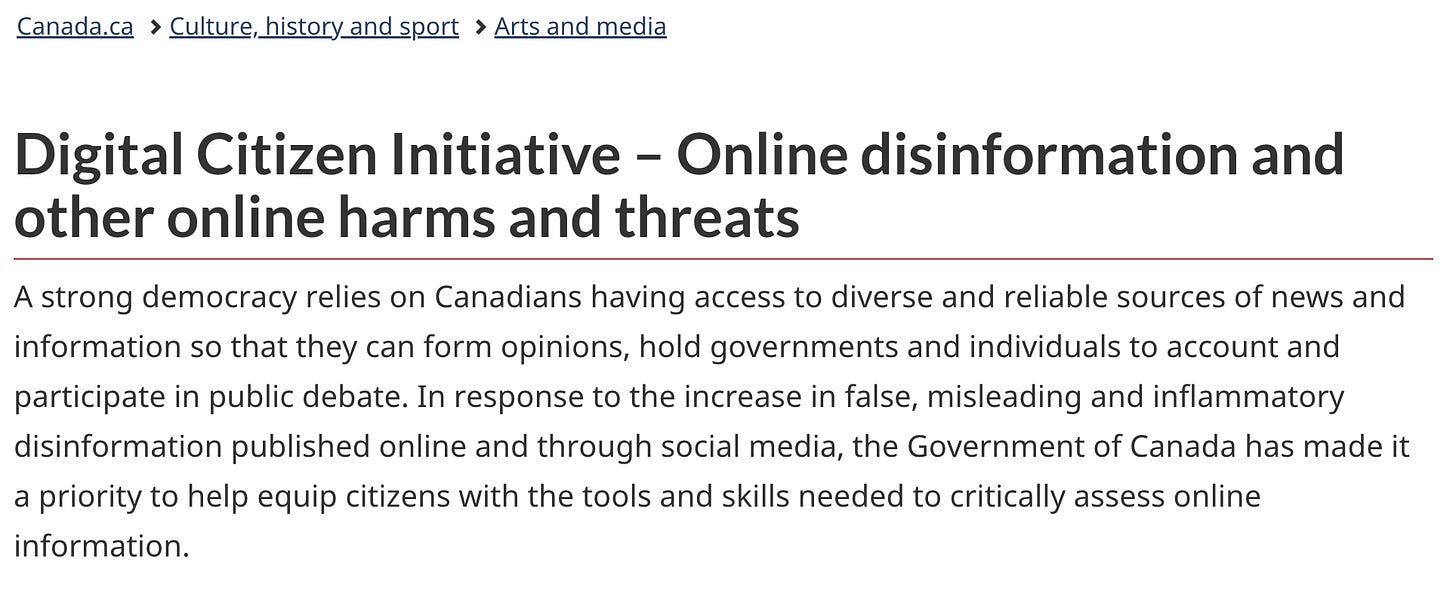
Except, of course, for the fact that the Government of Canada continues to aggressively fund “anti-disinformation” programs through its Digital Citizen Initiative—not just in regards to COVID-19, but also divisive topics such as the ongoing military conflict between Russia and Ukraine.22
Edelman’s Trust Barometer
On page 48 of the ATIP disclosure package, CBC celebrates a report that asserted that “public trust in those traditional news organizations soared to record highs in Canada as the pandemic took hold.”23 The report in question was a special Spring 2020 Edition of “The Trust Barometer,” a series published by marketing giant Edelman.24
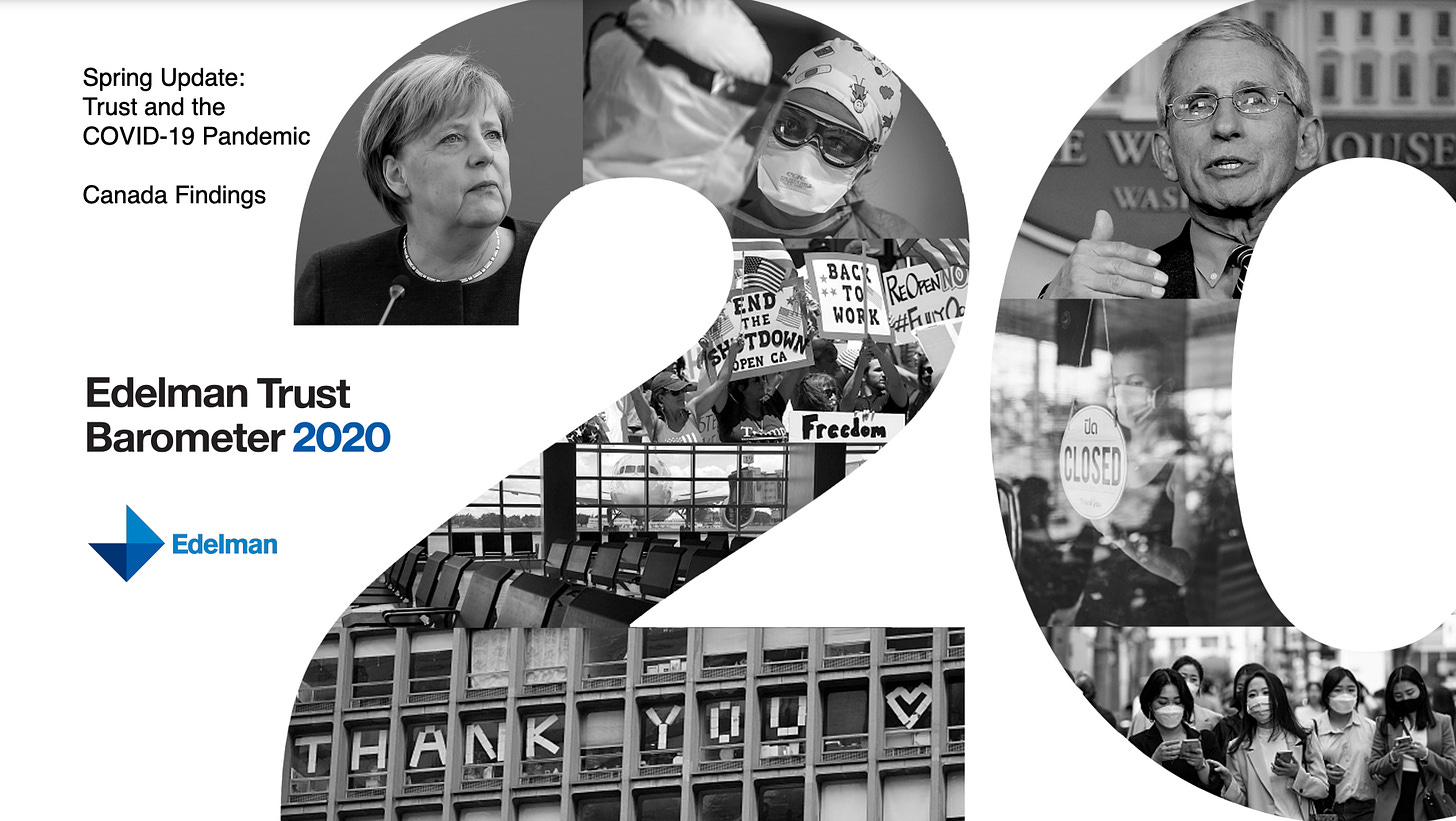
First of all, trust in Canadian media didn’t exactly “soar” as the CBC suggested. In fact, the report shows that it maxed out at 58%, which appears to be equal to where it was back in 2019. But after hitting that previous all-time high, trust fell by several percentage points as of January 2020, from which it returned in the initial three months of the declared COVID-19 pandemic. By January 2021, Edelman reported a 4-point drop in trust in Canadian media, back to 54%.25
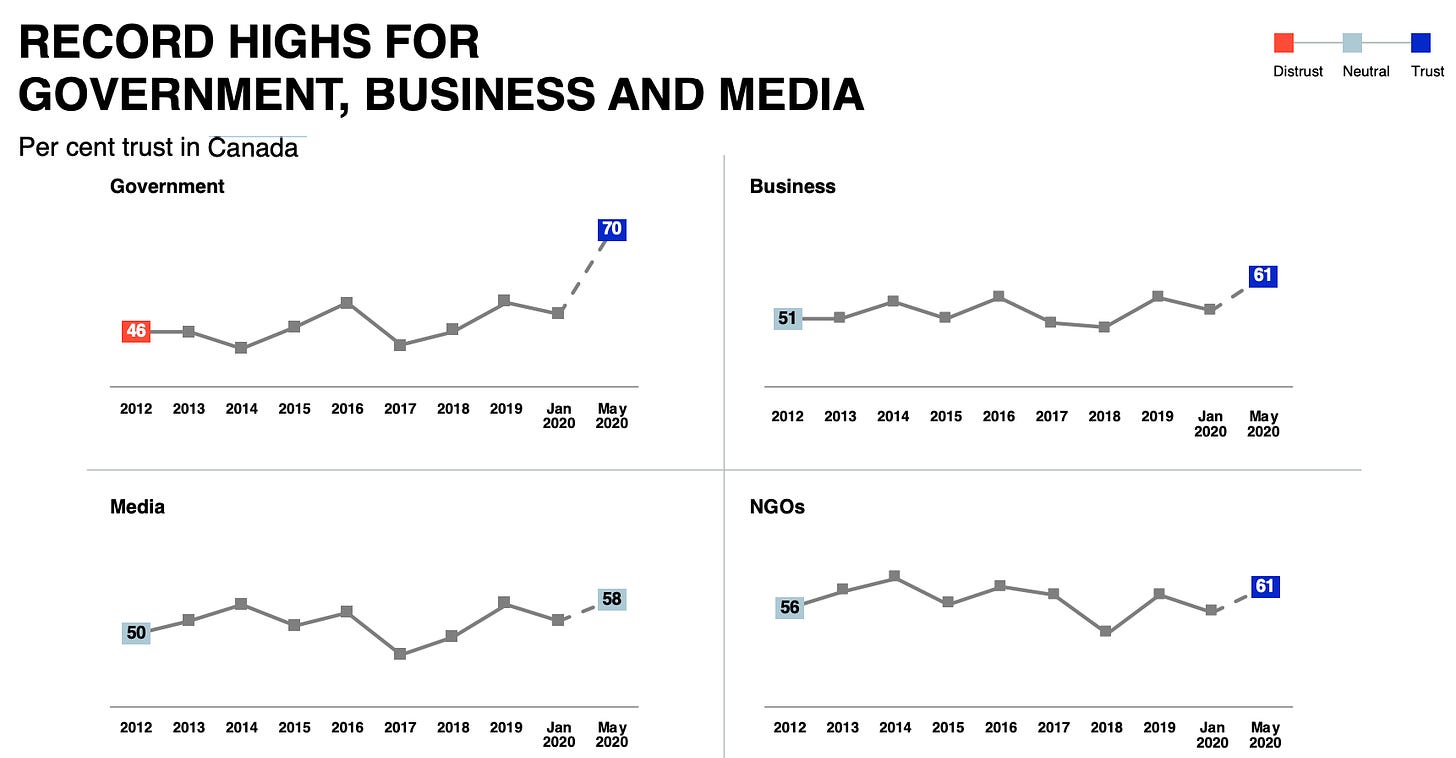
CBC’s highlighting of Edelman’s report in May 2020 is not a coincidence, though, for two reasons. First, note that the media saw a similar bump in public trust immediately following the terror attacks of September 11, 2001, which also began to falter after just a few months.26 Secondly, Edelman was one of the handful of organizations who participated in Event 201, the coronavirus pandemic planning exercise that took place in New York City in October 2019.27
The firm was represented by Matthew Harrington, Edelman’s global chief operating officer.28 During the event, Harrington offered this particularly helpful insight into how to maintain trust in institutions by controlling the flow of information. Here’s a YouTube clip posted by event co-host, the Johns Hopkins Center for Health Security (watch from 7:51-8:26):
Trusted News Initiative
Finally, on page 49 of the disclosure package, CBC highlights their participation as a member of the now-infamous Trusted News Initiative (TNI).
And as a member of the Trusted News Initiative, CBC/Radio-Canada joined an industry collaboration of major media and technology companies in March to rapidly identify and stop the spread of harmful coronavirus disinformation.
We view this work as essential public service and are fully committed to it. For as long as there’s an “infodemic,” CBC News aims to be part of the cure.
In case you haven’t yet heard of the TNI (or need a refresher), let’s take a quick moment to summarize the key facts.

The Trusted News Initiative is an international alliance of news media, social media and technology companies described as a “real-time, early warning system to flag serious disinformation that may pose a threat to life or the integrity of the electoral process.”29 CBC/Radio-Canada was a founding member, working right alongside fellow news outlets the Financial Times, Reuters and the Wall Street Journal in partnership with big tech companies like Facebook, Google and Microsoft.
Indeed, the group’s initial focus was on combatting so-called “disinformation” related to elections around the world, having been “activated for the general elections in the U.K., Taiwan, Myanmar and the U.S.”
The TNI was officially announced in September 2019 following an event called the Trusted News Summit convened by the British Broadcasting Corporation (BBC).30 A BBC media release cites “recent events such as the Indian elections” as the inciting incidents leading to the group’s creation.31, 32, 33
Though its founding mandate was related to elections, the TNI announced in March 2020 that it would “extend its efforts to identifying false and potentially harmful Coronavirus information.”34 But it didn’t abandon its original scope; in July 2020, the TNI announced it was working to “combat the spread of disinformation during the upcoming U.S. Presidential election.”35
Then, “with the introduction of several possible new COVID-19 vaccines” at the end of 2020, the TNI shifted again “to focus on combatting the spread of harmful vaccine disinformation.”36 In an accompanying article, the BBC offers several examples of what it deemed to be so-called “vaccine disinformation,” such as “widely shared memes which link falsehoods about vaccines to freedom and individual liberties,” and posts that “seek to downplay the risks of coronavirus and suggest there is an ulterior motive behind the development of a vaccine.”
Furthermore, the TNI also launched “a new initiative which will help TNI members to gain an understanding of the effectiveness of interventions to fight misinformation.” Led by the Reuters Institute for the Study of Journalism and First Draft News, the research study would “examine the effectiveness of different interventions which seek to educate audiences and prevent the spread of health disinformation.”
This is what the CBC is so proudly boasting to be involved with. Needless to say, Canadians reading the news would not have been alerted to their involvement in a psychological experiment of this scale, violating the principle of informed consent—and providing yet another reason why people should, indeed, be highly skeptical that their news and social media providers are behaving in a trustworthy manner.
If you feel this interpretation is a stretch, let me point out that this is not the only instance of a Canadian government agency running propaganda experiments on the unwitting population.
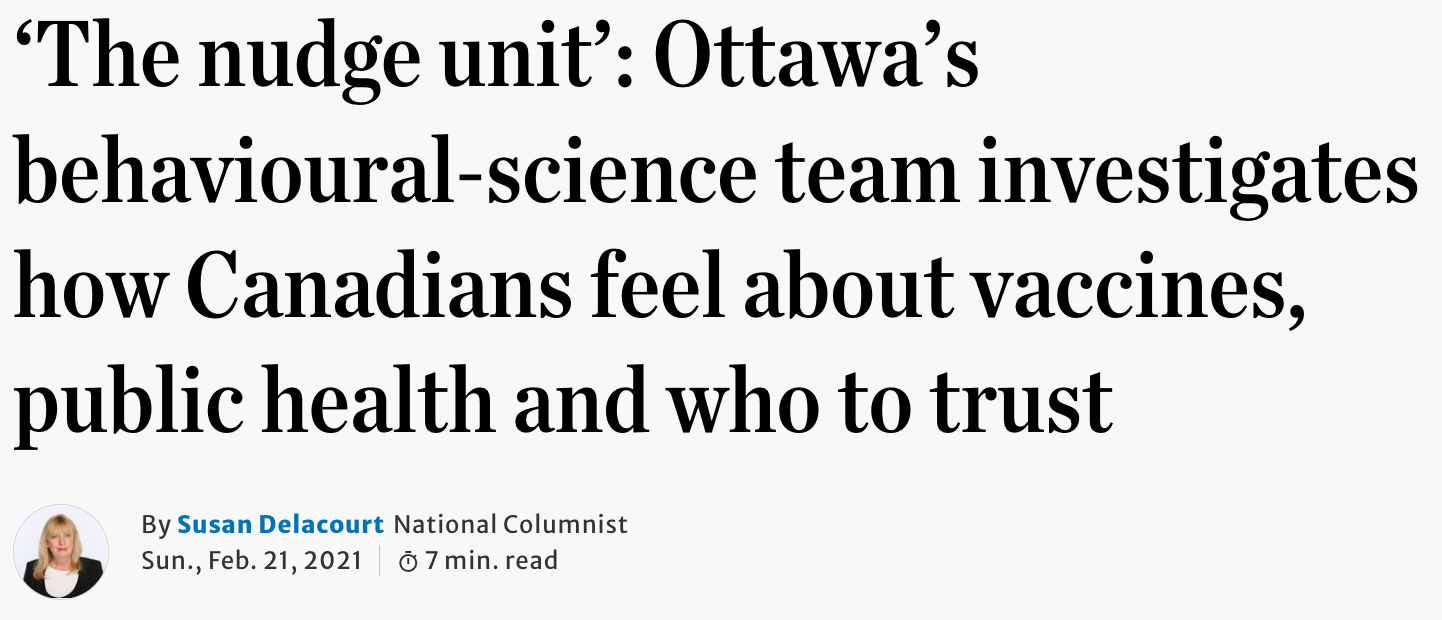
The Privy Council Office, one of the highest-level agencies of the Government of Canada, runs a program called Impact Canada, originally launched in 2017.37, 38 As highlighted by the Star Vancouver, starting in April 2020, Impact Canada conducted a “scientific experiment,” mostly “under the radar,” using behavioural science tools in which “ordinary citizens were the laboratory subjects.”39 The study is called COVID-19 Snapshot Monitoring (COSMO), and captures the “attitudes and behaviour on all things pandemic-related” of about 2,000 participants while implementing the “WHO Behavioural Insights tool on COVID-19 to inform response efforts, including policy, interventions and communications.”40
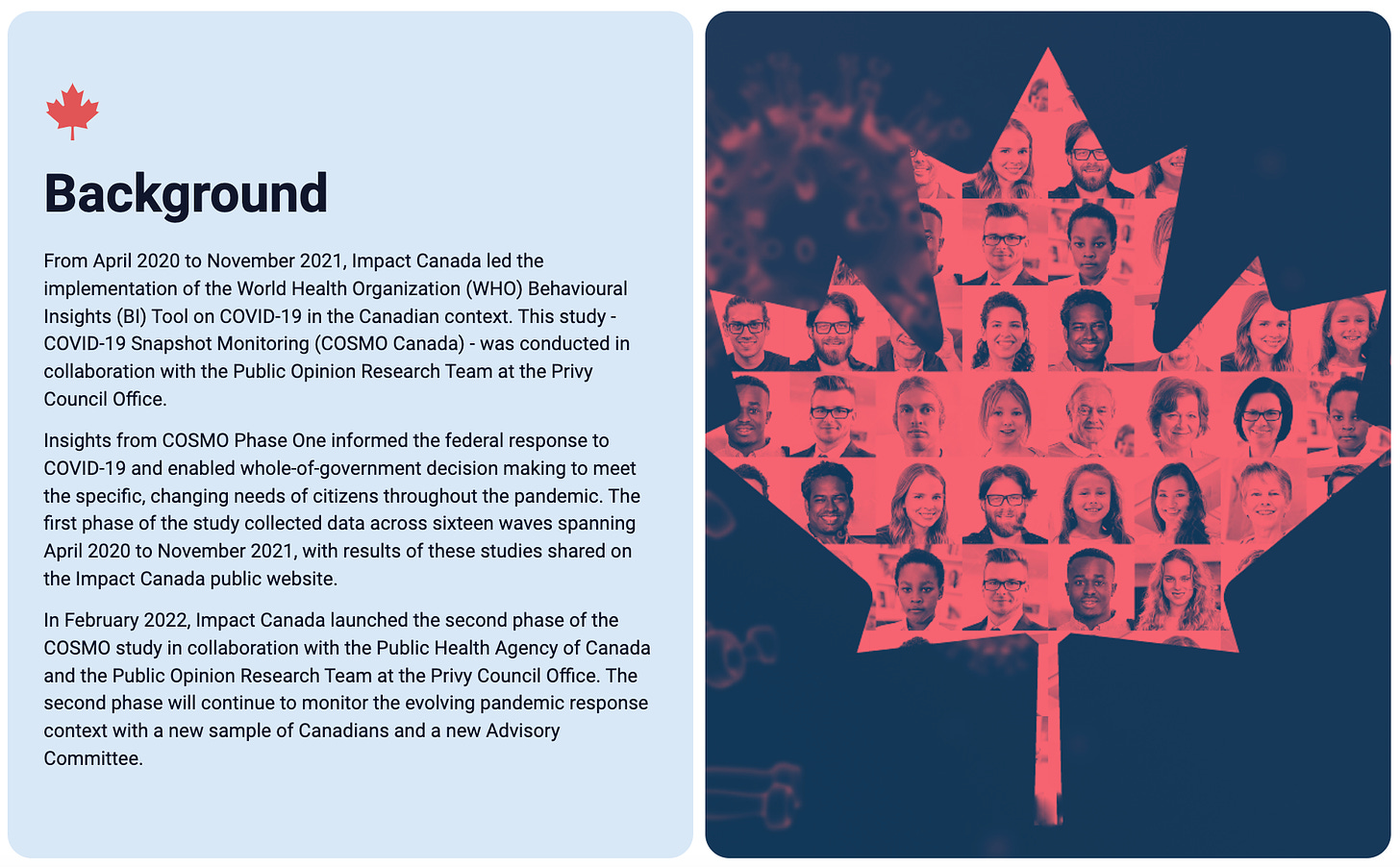
On February 5, 2021, Canada’s Chief Public Health Officer Theresa Tam acknowledged that such studies were being “carried out by the Privy Council Office, where there is a behavioural insight team,” which had contributed to “the intention for Canadians to get the vaccine” increasing since the beginning of Canada’s COVID-19 vaccine rollout. She then stated that the government planned to “work with the internet and social media companies and that has been happening with Facebook, Google, YouTube and others”—the very same companies working shoulder-to-shoulder with the CBC through the Trusted News Initiative.
From March 11-30, 2021, Impact Canada ran their fourth study on COVID-19 vaccines titled “Messaging in Response to Adverse Events Following Immunization.” The study tested seven possible messages, delivered randomly by modelled representatives of the “Government of Canada, a top Canadian medical professional, or a spokesperson for the vaccine manufacturer.” Impact Canada concluded that “behaviourally-informed messages… significantly outperformed the status quo communications strategy” when publicly addressing reports of adverse events related to COVID-19 vaccines.41
A May 2021 memo titled “Testing Behaviourally-Informed Messaging In Response To Severe Adverse Events Following Immunization” disclosed via an Access to Information (ATIP) request describes messaging guidance very similar to Impact Canada’s study, including recommending “that any COVID vaccine-related injuries or deaths be carefully managed with ‘winning communication strategies’ as to not ‘shake public confidence.’”42 In other words, the Government of Canada decided not to accurately inform Canadians of the true nature and rate of serious adverse events associated with the novel COVID-19 vaccine products, because it could risk turning people off of being injected. The result is that the general public has no sense of the scale of injury and death associated with the mass rollout of these products, even if they have opted not to take further boosters.
I can’t be more explicit: the Government of Canada chose to lie to Canadians about this, while censoring and vilifying anybody attempting to correct the record.
Conclusion
I hope this has been a helpful summary of what CBC News was up to during the COVID-19 era, particularly in the early days. While only some of the information provided in the ATIP request was new, the release package still provided an excellent opportunity to revisit early published articles and compare them to some of the internal emails we got to see, as well as other things we know were going on at the same time.
Download the ATIP response package
References
- Access to Information. CBC/Radio-Canada. Retrieved May 8, 2023, from https://web.archive.org/web/20230508235240/https://cbc.radio-canada.ca/en/impact-and-accountability/access-to-information ↩︎
- Aiello, R. (2021, August 15). Trudeau calls federal election, voters to go to the polls Sept. 20. CTV News. http://archive.today/2021.08.16-154655/https://www.ctvnews.ca/politics/federal-election-2021/trudeau-calls-federal-election-voters-to-go-to-the-polls-sept-20-1.5547815 ↩︎
- Blatchford, A. (2021, August 15). Trudeau injects vaccine hesitancy into spotlight of Canadian election. Politico. http://archive.today/2023.10.11-212821/https://www.politico.com/news/2021/08/15/trudeau-canada-election-vaccine-hesitancy-504938 ↩︎
- Krishnan, M. (2021, January 26). CBC Staff Call for Head of Journalistic Standards to Step Aside Following Ahmar Khan’s Dismissal. Vice. http://archive.today/2023.10.11-184407/https://www.vice.com/en/article/epdkgw/cbc-staff-call-for-paul-hambleton-head-of-journalistic-standards-to-step-aside-following-ahmar-khans-dismissal ↩︎
- Memo: JSP director Paul Hambleton leaving CBC. (2021, October 15). J-Source. https://web.archive.org/web/20231011214325/https://j-source.ca/memo-jsp-director-paul-hambleton-leaving-cbc/ ↩︎
- Paul Hambleton. LinkedIn. Retrieved October 11, 2023, from http://archive.today/2023.10.11-214151/https://www.linkedin.com/in/paul-hambleton-16008835/ ↩︎
- George Achi – Director of journalistic standards. CBC. Retrieved October 11, 2023, from http://archive.today/2023.10.11-215535/https://www.cbc.ca/news/author/george-achi-1.6787386 ↩︎
- Fenlon, B. (2020, March 29). An update on local services and all the ways to access COVID-19 information on CBC News. CBC. http://archive.today/2023.10.11-190828/https://www.cbc.ca/news/editorsblog/editors-note-covid-resources-1.5510077 ↩︎
- Nicholson, K. (2020, March 23). Viral video claiming 5G caused pandemic easily debunked. CBC News. https://web.archive.org/web/20200324152756/https://www.cbc.ca/news/technology/fact-check-viral-video-coronavirus-1.5506595 ↩︎
- Fenlon, B. (2020, May 25). Canada not immune to the virus of COVID-19 conspiracies. CBC News. https://web.archive.org/web/20231011232534/https://www.cbc.ca/news/editorsblog/editors-blog-fact-checking-coronavirus-misinformation-1.5583631 ↩︎
- Tracking the coronavirus. CBC News. Retrieved March 21, 2020, from https://web.archive.org/web/20200321005546/https://newsinteractives.cbc.ca/coronavirustracker/ ↩︎
- WHO Director-General’s opening remarks at the media briefing on COVID-19. (2020, March 11). World Health Organization. http://archive.today/2021.09.24-115506/https://www.who.int/director-general/speeches/detail/who-director-general-s-opening-remarks-at-the-media-briefing-on-covid-19—11-march-2020 ↩︎
- Zafar, A. (2020, March 14). COVID-19 vaccine research takes on new urgency. CBC News. https://web.archive.org/web/20200320145751/https://www.cbc.ca/news/health/covid-19-vaccine-research-1.5497697 ↩︎
- Coronavirus : G7 Leaders’ Statement. (2020, March 16). Élysée. http://archive.today/2023.10.12-194915/https://www.elysee.fr/en/emmanuel-macron/2020/03/16/coronavirus-g7-leaders-statement ↩︎
- MIGAL’s Coronavirus Vaccine Project. MIGAL – Galilee Research Institute. Retrieved October 12, 2023, from http://archive.today/2023.10.12-200424/https://www.migal.org.il/en/coronavirus-vaccine-project ↩︎
- Trudel, B. (2020, April 1). A vaccine of the future against COVID-19. Natural Sciences and Engineering Research Council of Canada (NSERC). https://web.archive.org/web/20231012201115/https://www.nserc-crsng.gc.ca/Media-Media/ImpactStory-ArticlesPercutant_eng.asp?ID=1619 ↩︎
- 2019 novel Coronavirus Global research and innovation forum: towards a research roadmap AGENDA (Version 7.0). (2020). GloPID-R. https://web.archive.org/web/20220527151256/https://www.glopid-r.org/wp-content/uploads/2020/02/covid-19-global-research-and-innovation-forum-2020-program.pdf ↩︎
- Shiab, N., Grasley, R., Nyx, A., Davidson, R., Ryan, A., Husser, A., & Haggarty, E. (2023, May 3). Are today’s temperatures normal? See how they compare to historical trends. CBC News. https://web.archive.org/web/20231012201548/https://newsinteractives.cbc.ca/features/2023/climate-dashboard/ ↩︎
- The Canadian Press. (2020, March 19). CBC temporarily scraps local TV newscasts, except for the North, due to COVID-19. Red Deer Advocate. https://web.archive.org/web/20231012204116/https://www.reddeeradvocate.com/news/cbc-temporarily-scraps-local-tv-newscasts-except-for-the-north-due-to-covid-19/ ↩︎
- Ahearn, V. (2020, March 25). CBC says it’s working to restore the local TV news it shelved last week. National Post; The Canadian Press. http://archive.today/2023.10.12-205126/https://nationalpost.com/pmn/news-pmn/canada-news-pmn/cbc-says-its-working-to-restore-the-local-tv-news-it-shelved-last-week ↩︎
- Prasad, R. R. (2020, February 17). Media Freedom and COVID-19. Global Affairs Canada. http://archive.today/2021.06.12-142121/https://www.international.gc.ca/world-monde/issues_development-enjeux_developpement/human_rights-droits_homme/policy-orientation-covid-19.aspx?lang=eng ↩︎
- Department of Canadian Heritage. (2023, March 20). Digital Citizen Initiative – Online disinformation and other online harms and threats. Government of Canada. https://web.archive.org/web/20231012210718/https://www.canada.ca/en/canadian-heritage/services/online-disinformation.html ↩︎
- Ibid (Fenlon). ↩︎
- 2020 Edelman Trust Barometer Spring Update Canada. (2020, May). Edelman Canada. https://web.archive.org/web/20231011232553/https://www.edelman.ca/sites/g/files/aatuss376/files/2020-05/2020%20Edelman%20Trust%20Barometer%20Spring%20Update%20Canada.pdf ↩︎
- 2021 Canadian Edelman Trust Barometer (p. 7). (2021). Edelman. https://web.archive.org/web/20231012212824/https://www.edelman.ca/sites/g/files/aatuss376/files/trust-barometer/2021%20Canadian%20Edelman%20Trust%20Barometer_0.pdf ↩︎
- Rosenberg, S. (2001, November 28). The Media’s Post-9/11 Image. Pew Research Center – U.S. Politics & Policy. https://web.archive.org/web/20231012212849/https://www.pewresearch.org/politics/2001/11/28/the-medias-post-911-image/ ↩︎
- Johns Hopkins Center for Health Security. (2019, October 14). Event 201 Facebook Event Announcement. Facebook. https://archive.org/details/event-201-facebook-event-announcement ↩︎
- Biography of Matthew Harrington | Participant for Event 201. Johns Hopkins Center for Health Security. Retrieved September 11, 2022, from http://archive.today/2022.07.08-135816/https://www.centerforhealthsecurity.org/our-work/exercises/event201/players/harrington.html ↩︎
- Fenlon, B. (2021, March 4). Canadian trust in journalism is wavering. Here’s what CBC News is doing about it. CBC News. http://archive.today/2021.03.05-052639/https://www.cbc.ca/news/editorsblog/editor-blog-trust-1.5936535 ↩︎
- New collaboration steps up fight against disinformation. (2019, September 7). BBC. http://archive.today/2021.04.30-133156/https://www.bbc.co.uk/mediacentre/latestnews/2019/disinformation ↩︎
- Reality Check Team. (2021, April 19). India election 2019: The debunked fake news that keeps coming back. BBC. http://archive.today/2022.05.30-222241/https://www.bbc.com/news/world-asia-india-47878178 ↩︎
- Das, A., & Schroeder, R. (2020, March 10). Online disinformation in the run-up to the Indian 2019 election. Information, Communication & Society, 24(12), 1762–1778. https://doi.org/10.1080/1369118X.2020.1736123 ↩︎
- Poonam, S., & Bansal, S. (2019, March 31). Indian Misinformation Will Decide World’s Largest Election. The Atlantic. http://archive.today/2019.04.01-134355/https://www.theatlantic.com/international/archive/2019/04/india-misinformation-election-fake-news/586123/ ↩︎
- Media Centre. (2020, March 27). Trusted News Initiative announces plans to tackle harmful Coronavirus disinformation. BBC. http://archive.today/2022.05.30-232326/https://www.bbc.com/mediacentre/latestnews/2020/coronavirus-trusted-news ↩︎
- Ramachadran, N. (2020, July 13). System Set Up to Fight Fake News During U.S. Presidential Election. Variety. http://archive.today/2020.08.02-231509/https://variety.com/2020/biz/news/fake-news-us-presidential-election-1234704593/ ↩︎
- Media Centre. (2020, December 10). Trusted News Initiative (TNI) to combat spread of harmful vaccine disinformation and announces major research project. BBC. http://archive.today/2022.01.24-172050/https://www.bbc.com/mediacentre/2020/trusted-news-initiative-vaccine-disinformation ↩︎
- About Impact Canada. Impact Canada. Retrieved February 13, 2023, from http://archive.today/2023.02.13-220315/https://impact.canada.ca/index.php/en/about ↩︎
- Project Timeline. Canada Beyond 150. Retrieved June 10, 2023, from http://archive.today/2023.06.10-185726/http://www.canadabeyond150.ca/timeline-en.html ↩︎
- Delacourt, S. (2021, February 21). “The nudge unit”: Ottawa’s behavioural-science team investigates how Canadians feel about vaccines, public health and who to trust. The Star Vancouver. http://archive.today/2021.06.21-034312/https://www.thestar.com/politics/political-opinion/2021/02/21/the-nudge-unit-ottawas-behavioural-science-team-investigates-how-canadians-feel-about-vaccines-public-health-and-who-to-trust.html ↩︎
- COSMO Canada. Impact Canada. Retrieved January 31, 2022, from http://archive.today/2022.01.31-124327/https://impact.canada.ca/en/cosmo-canada ↩︎
- Applying BeSci to the COVID-19 Response. Impact Canada. Retrieved June 10, 2023, from https://web.archive.org/web/20230610193828/https://impact.canada.ca/en/behavioural-science/timeline ↩︎
- Postmedia News. (2023, June 6). Privy Council advocated downplaying COVID vaccine injuries or deaths. Toronto Sun. http://archive.today/2023.06.06-205005/https://torontosun.com/news/national/privy-council-advocated-downplaying-covid-vaccine-injuries-or-deaths ↩︎
